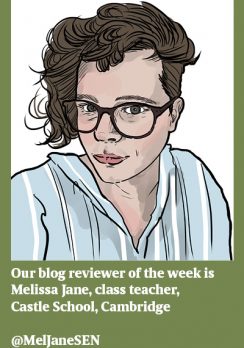Melissa Jane’s top blogs cover accessibility, sensory storytelling, the power of gardening and the extra load of living with racism
Thinking Out of the Box
@eyecantalk
As we begin to take tentative steps out of lockdown and back to (dare I say it?) normality, it’s worth remembering that the “normal” we had before didn’t work for everybody. Since the beginning of the pandemic, disabled people have been pointing out that adaptations we’ve been requesting for years (such as remote attendance at lectures and performances) suddenly became “magically possible” when non-disabled people needed them in lockdown.
This post by Jonathan Bryan, who talks and writes using eye-gaze technology, explains how his sister’s school enabled him to participate in lessons during the pandemic thanks to the creative and flexible mindset we’ve all had to adopt in the past year. He hopes ̶ as I do ̶ that this mindset will continue post-Covid, creating a new, better normal that includes everyone.
Creating Sensory Access Through Stories
@jo3grace
We’re all about to rediscover crowds, concerts and the inside of restaurants, which will mean plenty of new sights, sounds and smells. That makes it a great time to make sure we’re supporting our learners with sensory processing needs, with the help of the ever-insightful Joanna Grace.
Here, Grace offers a concise introduction to sensory storytelling, using “smells, touches, sights, sounds and even tastes and movements” to create a narrative experience. Sensory stories can be adapted from existing stories, but here, Grace’s focus is on enabling practical access ̶ for example, introducing learners to the sensory experience of going to the hairdressers or catching a train. I use sensory stories all the time in my literacy lessons, but this post made me think about how we can use them as access tools as the world re-opens.
The Power of Gardening on the Mental Health of Children
Cath Baynton via @sfmtweet
I can often be sceptical of “awareness” weeks, especially for topics as complex as mental health. However, this year’s theme of ‘nature’ strikes a chord with me, and this post offers a touching overview of the benefits of cultivating gardens for children’s mental health. The quotes from young people are especially lovely; it’s hard to argue with “planting seeds is really peaceful”.
Like mental healthcare, however, it’s easier to write about than to put into practice. With the heavy academic demands of the mainstream curriculum, where is the time and space for gardening? As one young person quoted puts it: “I didn’t like how little time we had. I wanted to stay for more time.” Hopefully, the work of organisations like School Food Matters can help schools make that happen.
Black Woman’s Load
@_ShonaghReid via @DiverseEd2020
I’ve written previously about the need to make sure our commitments to anti-racism are more than platitudes. This blog by Shonagh Reid, first published on her blog last month and featured on DiverseEd this week, is essential reading for educators who want to do just that.
Reid’s post discusses a UCL report which details the “additional ‘hidden workload’ of coping with racism” faced by black teachers in UK schools. Reid explains what this looks like for black women specifically:
“We don’t want to be seen as aggressive. So what do we do? We ensure we plan our conversations carefully. We read books on difficult conversations and plan in detail what we are going to say. How will we sit? Where will we sit? What will we offer in a way of refreshment? What will we wear? […] let’s examine colours, fabrics and the cut of our clothes to soften the image.”
Reid asks non-black educators to “understand more about [our] own fears and biases”, so that the black women we work with can “put down their load”. In this time of post-Covid transition, we are all thinking about what to take with us and what to leave behind: let’s make sure we are paying attention to who has to carry the most.













Your thoughts